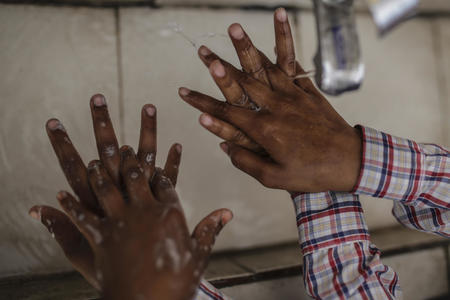“I love school but I have a fear of COVID” – sending pupils back to school without clean water and soap

Every year as September rolls around parents, carers and children across the UK prepare for the return to school.
This year the number one priority for parents and teachers alike will be making sure children stick to the hygienic habits they’ve been practicing at home to protect themselves against coronavirus – especially washing their hands with soap regularly.
Keeping their children safe from illness at school is of course a concern shared by parents and teachers across the world, not just in the UK. But a recent study by JMP (Joint Monitoring Programme for Water Supply and Sanitation) has found that 2 in 5 schools around the world don’t have clean water for children to wash their hands with.
Not having clean water in school is a serious issue at the best of times, let alone during a global pandemic. Without clean water to drink children are constantly thirsty and dehydrated, compromising their concentration in class. If they have no choice but to drink dirty water they risk getting sick, meaning they miss out on more vital schooling.
The power of good hygiene at school
That’s why many of our projects focus on bringing clean water, decent toilets and good hygiene to schools and their students. Sahkuntala Arora is the principal at South Delhi Nigam Primary School in India, where they’ve recently built eight new handwashing stations.
“The school’s infrastructure has improved immensely. The number of taps has increased from 4 to 12 now. There are WASH (water, sanitation and hygiene) messages displayed at the toilets and handwashing stations so that children are reminded about the message.”
Sahkuntala has noticed that all of the children now wash their hands before eating their midday meal – which will help guard against the spreading of illnesses like COVID-19. The children are also sharing what they’ve learnt about good hygiene with their families and communities, so the knowledge is spreading beyond the school gates.
Without clean water, school children are vulnerable
Now with the added threat of COVID-19, 818 million pupils returning to schools that don’t have basic handwashing facilities will be more vulnerable to the illness, if they can’t regularly wash their hands.
We spoke to pupils and teachers from schools that are facing these very problems to see how they feel about the next school year…
15-year-old Anisha goes to a secondary school in Dolakha, Nepal, where classes are running in the morning. She told us “I love to go to school, but at the same time the fear of COVID-19 still persists.”
There are only two or three places students can wash their hands, which in a large school means they’re in high demand and very crowded at break times. So not only is it hard for Anisha to keep her hands clean, it also makes social distancing very difficult.
“To prevent the spread of diseases we have to maintain social distancing, use sanitizers properly, wash our hands with soap and use masks. If masks and sanitizer were available in the school, I would feel more secure.”
Anisha’s father Yam is a teacher at another school in the same area, so he’s worried about his pupils as well as his daughter. Although there haven’t been any reported cases of COVID-19 in the area, he says that a fear has spread. His school hasn’t reopened yet.
“I am more worried about the teaching of our students, which is our main job. We have not been able to teach the students, the future pillars of the nation,” he explained.
Mphatso is a caregiver who works at an early development centre for young children in Malawi. She and her colleagues are facing the same problems and worries when it comes to keeping their pupils safe. “Every day I get worried that once the coronavirus makes its way here our children will be most affected,” she told us.
The school doesn’t have clean water on site. Instead they collect it from a borehole in the village, but Mphatso is optimistic that it’s enough to keep the school running. She says they will maintain social distancing and encourage the children to keep washing their hands, but “we need a lot of soap to make sure that the children can wash their hands regularly.”
We all know that one of the most effective ways to help stop the spread and keep safe is by washing our hands. It's not fair that half the world's children are going back to school knowing that they won't be able to do this.
Let’s make sure that all schools around the world have the basic necessities of clean water, decent toilets and good hygiene to help protect children. With the ability to wash their hands and have a clean drink of water, children everywhere will have a better opportunity to live a healthy, happy life.
Will you join us in calling for the UK Aid budget to prioritise clean water?
We’re asking our supporters to email their MP today asking them to contact Dominic Raab, the head of the new Foreign and Development Office, and urge him to show global leadership in prioritising water, sanitation and hygiene and pushing other governments to do the same.
We’ve prepared a simple email for you so it will only take you a minute.









